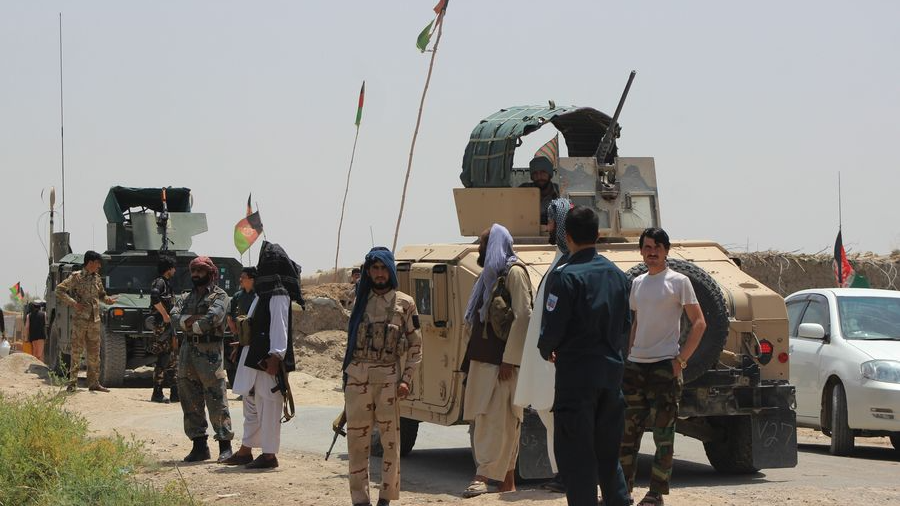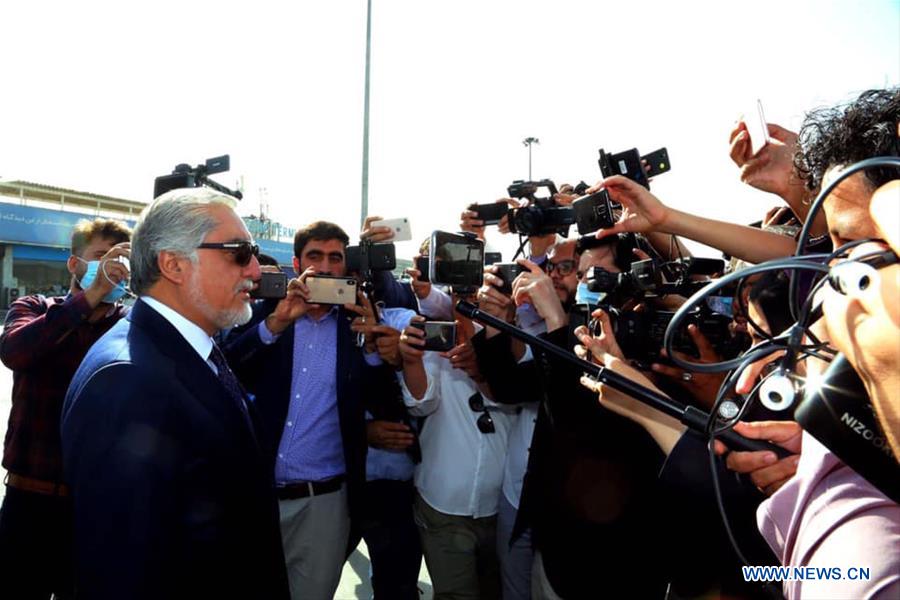
Afghan security force members take part in a military operation in Helmand Province, Afghanistan, July 18, 2019. /Xinhua
Afghan security force members take part in a military operation in Helmand Province, Afghanistan, July 18, 2019. /Xinhua
Editor's note: Hamzah Rifaat Hussain is a former visiting fellow at the Stimson Center in Washington, and currently serves as assistant researcher at the Islamabad Policy Research Institute (IPRI) in Pakistan. The article reflects the author's opinions, and not necessarily the views of CGTN.
On October 18, the United States military defended their airstrikes against Taliban fighters earlier this month, which had alarm bells ringing in insurgent ranks over how the Trump administration is violating the February 2020 Doha peace agreement signed between the two sides.
The letter and spirit of the agreement is now in jeopardy due to what the Taliban believe are gross violations of Afghanistan's territorial sovereignty and direct support provided to Afghan security forces against the insurgents.
While the Taliban's activities will always be contentious as spikes in violence reported across the country during the ongoing Intra-Afghan dialogue clearly demonstrate, the implications of violating the Doha peace deal are severe in an already polarized and troubled security environment. The spillover effects of reneging on the peace deal also have regional implications.
Firstly, the ongoing Intra-Afghan dialogue process is already mired with trust deficits and disagreements on key issues such as prisoner swaps and jail breaks and is predicated upon the February 2020 Doha peace deal.
It was agreed in the deal that the Taliban will not launch attacks against American forces from Afghan soil alongside guarantees that a complete withdrawal of foreign forces under a stipulated timeline in the presence of international witnesses will be ensured.
Section F in Part One of the agreement makes it clear that the U.S. will refrain from the threat or the use of force against the territorial integrity and political independence of Afghanistan and will not intervene in its internal affairs. Airstrikes are hence a clear violation of this, which risks igniting a tinderbox in a country where violence has already wreaked havoc on peace and tranquility efforts and jeopardized the subsequent ongoing intra-Afghan dialogue.
According to Washington's narrative, airstrikes were launched in response to a major Taliban offensive in the southern Helmand Province which was aimed at capturing its capital, Lashkar Gah. As per Taliban accounts, the group made significant gains against the Afghan security forces in Helmand and the subsequent airstrikes to defeat their offensive were viewed as unwarranted.

Chairman of the High Council for National Reconciliation Abdullah Abdullah talks with the press in Kabul, capital of Afghanistan, September 11, 2020. /Xinhua
Chairman of the High Council for National Reconciliation Abdullah Abdullah talks with the press in Kabul, capital of Afghanistan, September 11, 2020. /Xinhua
This widening trust deficit between the two main stakeholders in the peace deal is taking place amidst widespread violence inflicting immeasurable harm to families in Helmand, with 30,000 people reportedly forced to leave their homes.
The dire humanitarian crisis is festering due to the inability of the Trump administration to honor key provisions of the agreement. History in Afghanistan is replete with instances where American policymaking has bred skepticism over the exact motivations of key strategies, which acted as justifications for the Taliban to carry out attacks against Afghan civilians, NATO forces and security personnel.
A repeat of the same is likely in the post-Doha peace deal scenario, despite spokesperson for the American forces Sonny Leggett issuing denials that airstrikes are violating the deal. The central issue lies in emboldening a potential peace stakeholder into a violent insurgent group further, in the absence of a credible deterrent on attacks killing thousands of innocent Afghan civilians. Such duality is viewed as hypocritical by several anti-American forces which risks descending the war-torn country into further chaos.
At the same time, the absence of a counter offensive during or in the aftermath of the dialogue process ensures that violence continues unabated in Afghanistan which is a fair argument.
However, there are other strategies that can be mulled over to mitigate tensions, such as dialogues, negotiations and reconciliation efforts to allay the grievances of both the government and the insurgent group for a more inclusive peace settlement. A constructive approach has the potential to allow for non-state actors to cease violence, even if back channel diplomacy efforts are in their nascent stages.
So far, none of these approaches have been pursued, with the U.S. either adopting a hands-off approach to Afghanistan after the Doha peace deal was signed, or pursuing gross intervention by backing one actor at the expense of the other.
Interestingly enough, when the Doha peace deal was initially signed, it marked the absence of the Ashraf Ghani administration as a key stakeholder. Thus, for the Trump administration to justify airstrikes in aid to the very same government is ironic, breeds hostility and promotes suspicion to the detriment of peace.
The Trump administration could do well by not reneging on peace agreements as it has far reaching consequences for the Afghan population, which is both war-fatigued and desirous of a quick resolution to its decades-long conflict.
Otherwise, the aim of sustainable peace and tranquility in the region and beyond will remain elusive with regional prospects of connectivity projects, such as the Belt and Road Initiative, hinging heavily upon the success of the ongoing intra-Afghan dialogue process.
By conducting airstrikes in Helmand Province and aggravating the already tenuous situation in the country, the Trump administration has once again demonstrated that its zero-sum game approach will only prolong tensions instead of resolving them, with the Afghan quagmire very much here to stay.
(If you want to contribute and have specific expertise, please contact us at opinions@cgtn.com.)